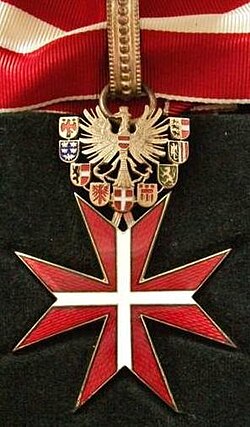History

Over time, the National Council of Austria has enacted a series of laws establishing the various decorations and medals which now make up the Austrian honours system. Among these were
- in 1952, the "Decoration for Services to the Republic of Austria" (Ehrenzeichen für Verdienste um die Republik Österreich) [1] – awarded in 15 classes.
- in 1955, the "Austrian Decoration for Science and Art" (Österreichisches Ehrenzeichen für Wissenschaft und Kunst) [1] – awarded in 3 classes.
- in 1976, the "Decoration for Services to the Liberation of Austria" (Ehrenzeichen für Verdienste um die Befreiung Österreichs) [1] – awarded in 1 class.
- in 1989, the "Military Merit Decoration" (Militärverdienstzeichen) [1] – awarded in 1 class.
